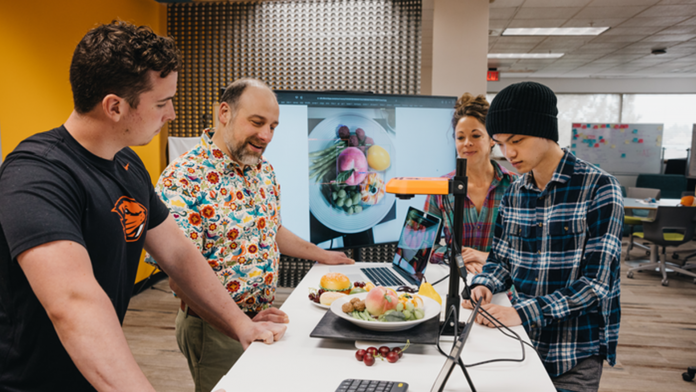A research project has received $640,000 in funding to use Artificial Intelligence (AI) applications to track household food waste.
The project will be led by Patrick Donnelly, Assistant Professor of computer science at Oregon State University’s College of Engineering. More than one-third of all food produced in the US goes to waste, so the project may solve a multi-billion-dollar annual problem.
“At every other step of the agricultural supply chain, waste is tracked, measured and quantified,” Donnelly explained.
“However, approaches to measuring post-consumer waste are costly, time-intensive, prone to human error, and infeasible at a large scale.”
Using AI applications to measure how much food we waste
Donnelly and his colleagues are creating a kitchen compost container that automatically measures how much food households waste.
He said: “We’re adapting our design to accommodate consumers’ current behaviour, using compost bins commonly distributed by waste utilities as a template.”
“When a user disposes of edible and non-edible food waste in the bin, our device uses AI applications to prompt the user to describe the deposited items. The user’s note is then transcribed with automatic speech recognition and associated with a weight measurement of the items.”
Additionally, the device will collect 3D images and sensor measurements of the waste, resulting in an “entirely novel dataset to enable and encourage future researchers to tackle the problem of food waste measurement with computer vision.”
Wasted food is becoming a worldwide problem
The research is supported by the Foundation for Food & Agriculture Research and the Kroger Co. Zero Hunger | Zero Waste Foundation.
According to the Foundation for Food & Agriculture Research, around 37% of food waste in the US occurs in homes. This adds up to a staggering $400bn worth of wasted food every year.
Aside from economic inefficiency and the moral disaster of throwing away food, this waste generates significant amounts of greenhouse gases, including carbon dioxide and methane.
“There’s a familiar adage: You can’t manage what you don’t measure,” Donnelly said. “Our goal is to inspire future waste reduction by specifically quantifying, measuring, and tracking the amount of food that home consumers send to compost.”
Collecting a dataset
As part of the project, researchers will run a small pilot study. This will likely be carried out in Spring 2024.
Donnelly stated: “After we design the device, we will distribute them to study participants. The purpose of the preliminary study is to test the technology and collect measurements and images for a waste dataset.”
Currently, this type of research is performed by tasking small groups of participants to manually weigh their food waste and record the measurements in a journal. However, Donnelly thinks that the proposed solution is more efficient.
“Our solution would fully automate this process, enabling researchers to collect this data more accurately and efficiently,” he said.
“Our work is a first step towards developing a fully autonomous, computer vision solution that would enable households to track the amounts and types of food compost waste they generate. With these personalised and data-driven interventions, we hope to inspire consumers to reflect upon and change their behaviours with respect to wasted food over time.”









